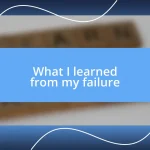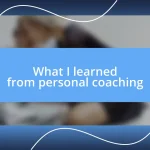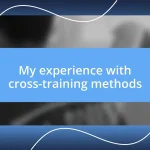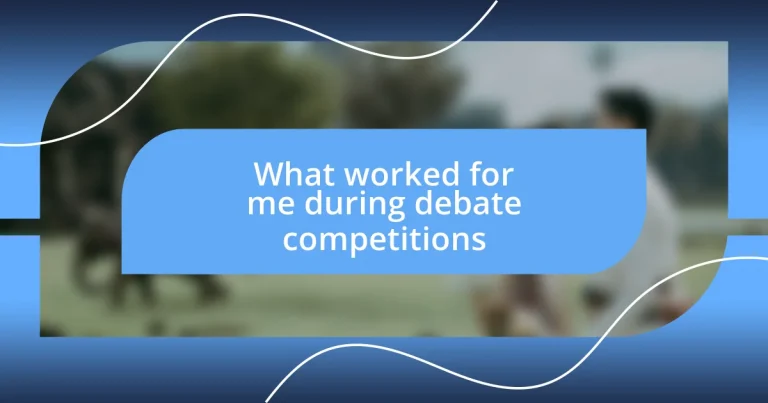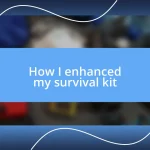Key takeaways:
- Understanding different debate formats is essential for effective participation, as each has unique rules and focuses, such as research in Policy debates and emotional connection in Lincoln-Douglas.
- Mastering research techniques—like utilizing diverse sources and creating research maps—enhances preparation and argumentation confidence in debates.
- Practicing speaking skills, managing anxiety through visualization and breathing exercises, and reflecting on feedback are vital for improving debate performance and confidence.
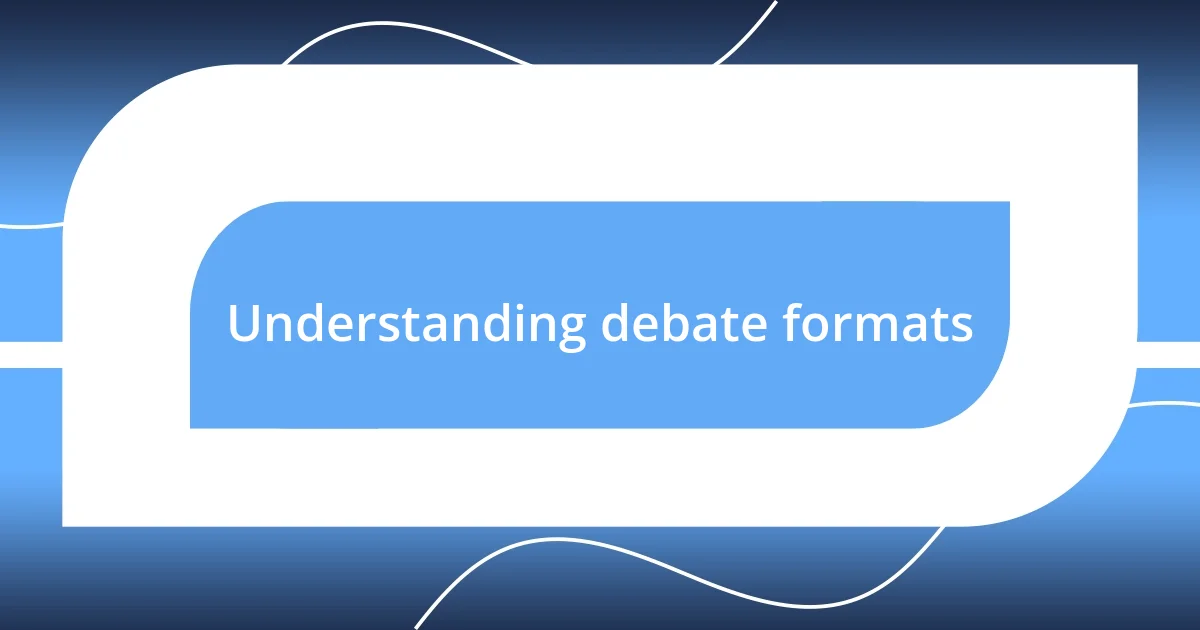
Understanding debate formats
In my early debate days, I quickly realized how crucial it is to grasp the different formats. Each style, whether it’s Lincoln-Douglas, Policy, or Parliamentary, has its own rules and pacing. Have you ever found yourself caught off guard, unsure of what’s expected in a round? I know I have, and it’s an unnerving experience!
For instance, in Policy debates, the emphasis is often on extensive research and case construction. I vividly remember a round where I dove deep into a particular case, only to find my opponent had a counter that I hadn’t anticipated. It was a humbling reminder of how preparation in understanding the format can dictate the flow of the debate.
Conversely, with Lincoln-Douglas debates, the focus shifts to values and ethical principles. It’s not just about facts, but about connecting emotionally with the judges. I’ve felt the adrenaline rush of presenting my stance fiercely, only to realize later that conveying passion can sometimes outweigh even the strongest evidence. How do you balance logic with emotion in your arguments?
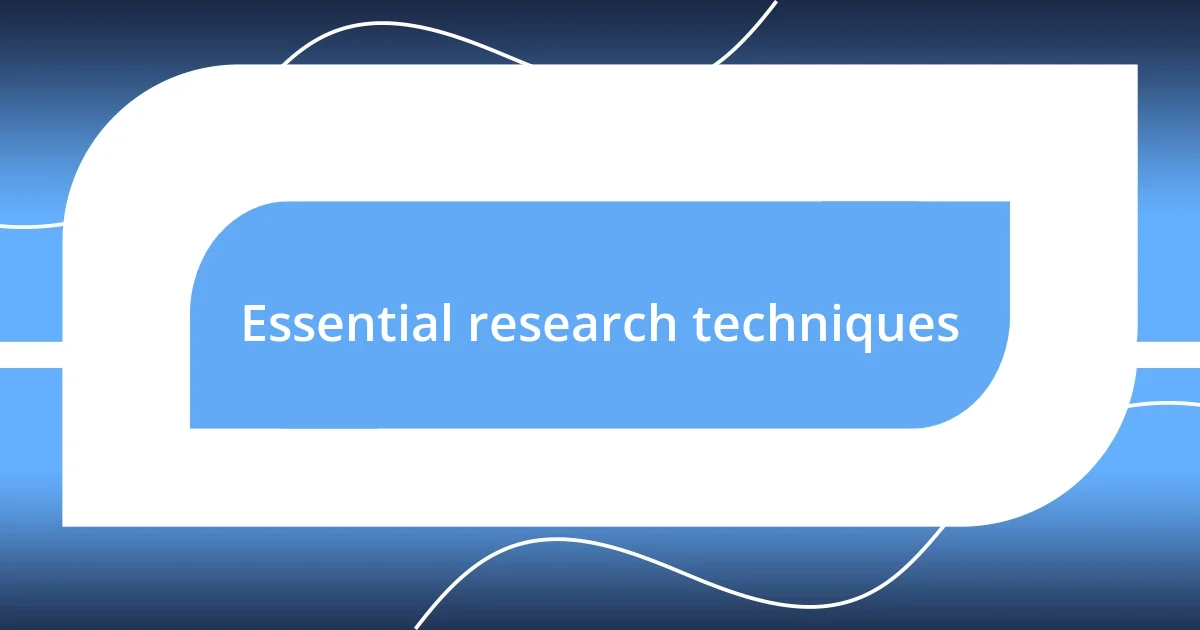
Essential research techniques
When it comes to debate competitions, effective research techniques can truly make or break your performance. I remember poring over academic journals and reputable sources, especially when preparing for a challenging topic. The thrill of uncovering a compelling statistic or an unexpected argument always felt like hitting the jackpot. Not only did I feel more confident, but I also loved the ability to pull out specific evidence that caught the judges’ attention.
Here are some essential research techniques that worked for me:
– Utilize Diverse Sources: Don’t just stick to one type of resource; mix up articles, books, and credible websites to get a well-rounded understanding of your topic.
– Summarize Key Points: As you read, jot down important arguments and counterarguments. This helps in crafting rebuttals on the fly.
– Create a Research Map: Visualize connections between ideas. Mind maps helped me see the bigger picture and how different points related to each other.
– Stay Current: Debate topics can evolve, so keep up-to-date with the latest developments, especially those affecting the theme you’re discussing.
– Practice Articulating Your Findings: Discussing your research with peers can help solidify your understanding and prepare you for presenting those arguments confidently.
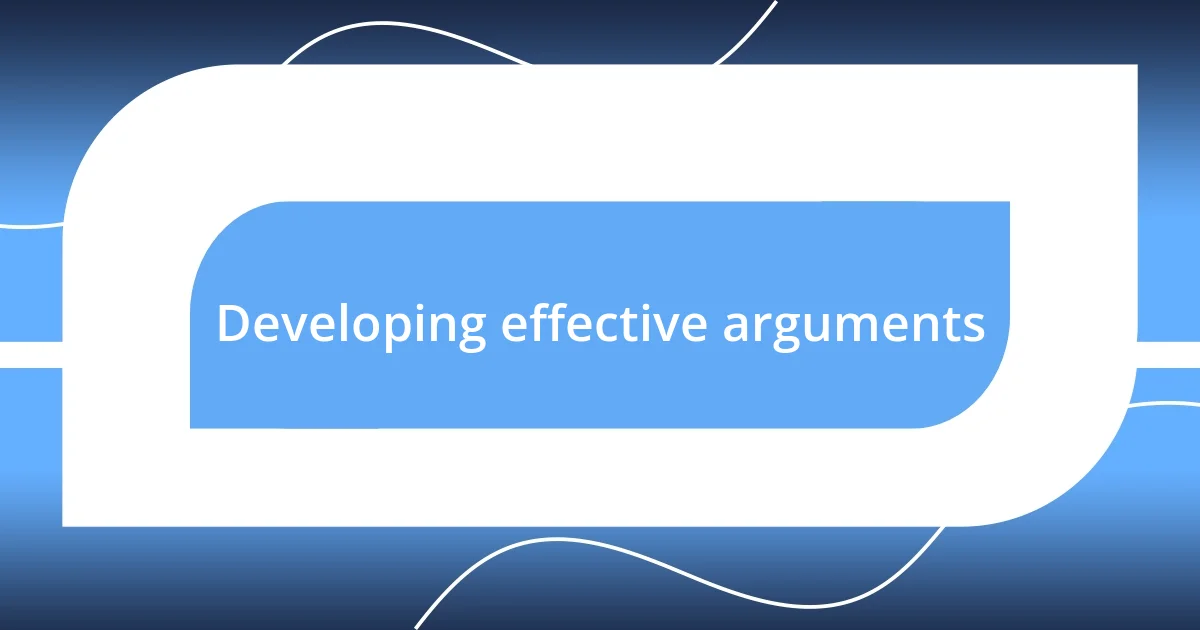
Developing effective arguments
Developing effective arguments starts with a clear understanding of the core message you want to convey. I’ve found that focusing on one main idea can significantly enhance your clarity and persuasiveness. In one competition, I narrowed down my stance to a single, powerful assertion. This approach not only made it easier for me to defend my position but also allowed my audience to grasp my argument without getting lost in a labyrinth of details. How do you decide what your main point should be?
Building upon that main idea, I emphasize the importance of supporting it with robust evidence. There was a tournament where I spoke passionately about climate change, backed by a mix of scientific studies and impactful personal stories about my community’s struggle with rising waters. Witnessing judges nodding in understanding felt rewarding. The emotional weight of personal anecdotes can resonate deeply with the audience, giving your argument an additional layer of depth.
Finally, anticipating counterarguments is key to fortifying your case. During one memorable debate, I deliberately identified potential objections to my position ahead of time. As I presented, being prepared with solid rebuttals not only boosted my confidence but also helped me maintain control of the narrative. Remember, it’s not just about arguing your point; it’s about engaging in a dialogue that addresses both sides.
| Element | Description |
|---|---|
| Main Idea | Focus on one clear message to improve clarity. |
| Supporting Evidence | Use robust evidence, including research and personal stories. |
| Anticipating Counterarguments | Prepare rebuttals to acknowledge and address opposing views. |
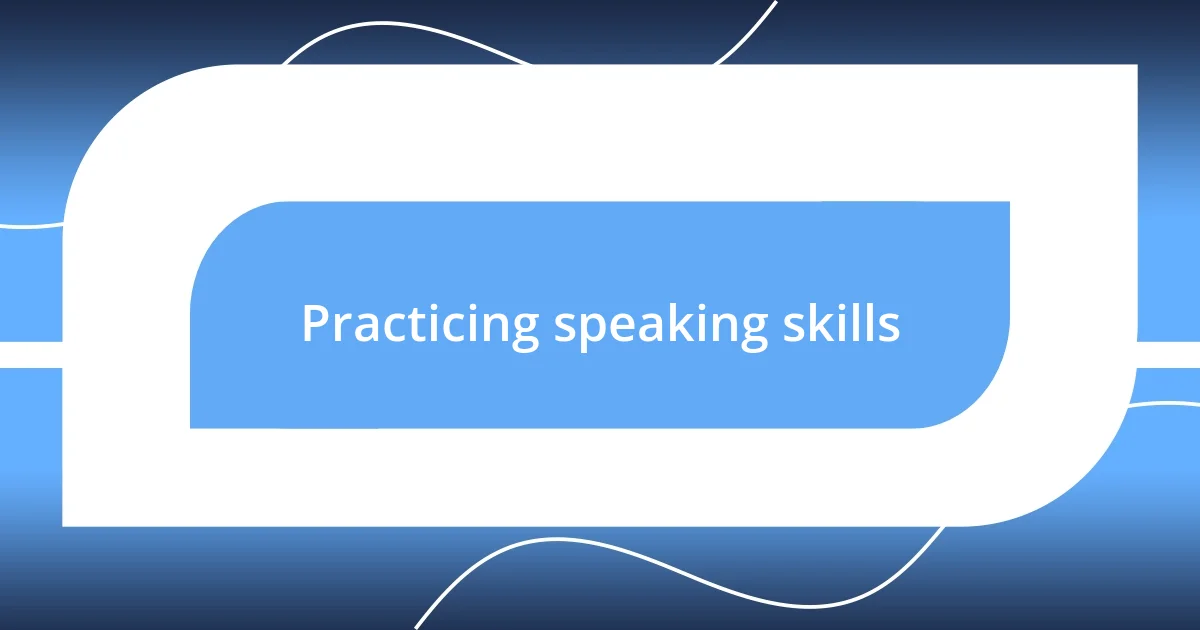
Practicing speaking skills
Practicing speaking skills was truly a game-changer for me in debate competitions. I vividly recall spending hours in front of a mirror, rehearsing my arguments out loud. It felt a bit silly at first, but seeing my expressions and hearing how my words flowed made a world of difference. I often wonder how many others benefit from this simple practice.
I also joined a local debate club where we held mock debates. The feedback from peers was invaluable; it’s much easier to spot areas for improvement with an audience. I remember one specific instance where my teammate pointed out my tendency to rush through key points. Adjusting my pacing not only made my arguments clearer but also allowed the judges to digest the information better. Have you ever noticed how a slight change in delivery can transform your message?
Additionally, recording my practice sessions turned out to be incredibly helpful. Listening to myself gave me insights into my tone and clarity that I couldn’t catch in the moment. It was eye-opening to hear the nervousness creep in during crucial parts of my speeches. Each playback taught me something new about how I communicate. Every practice session brought me closer to my ideal speaking style, and I believe this approach can help any aspiring debater.
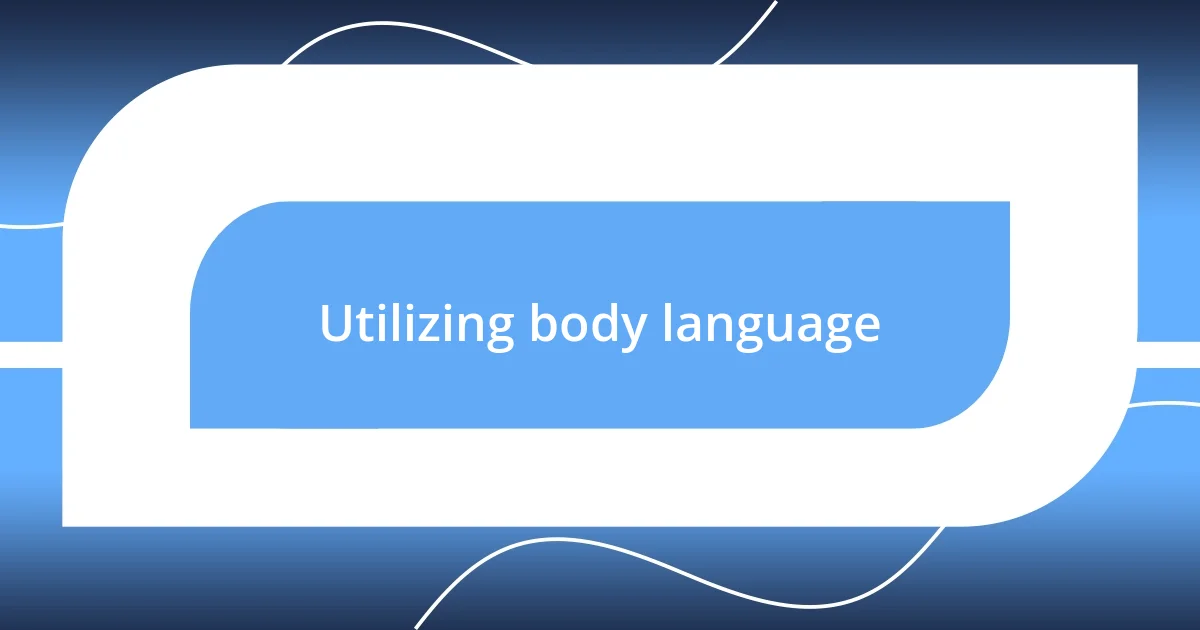
Utilizing body language
Utilizing body language effectively was a crucial element in my debate competitions. I can still recall one intense round where I noticed a subtle shift in my posture during a key argument. Standing tall and leaning slightly forward not only conveyed confidence, but it also appeared as if I truly believed in what I was saying. Do you ever think about how your physical presence can influence your message? It’s fascinating how confident body language can draw the audience in and make them more receptive.
In another instance, I integrated hand gestures to emphasize my points. As I passionately spoke about social injustices, I remember extending my hands to illustrate the disparity I was describing. It felt natural, and I could see the audience responding, their eyes widening as they connected visually with my words. Have you noticed how certain gestures can create a vivid image? Using my hands became almost like an extension of my thoughts, reinforcing the emotional weight of my arguments.
I also learned the importance of maintaining eye contact. During a particularly heated debate, I made a conscious effort to engage every corner of the room with my gaze. Instead of locking eyes with just the judges, I reached out to the audience. This not only helped me gauge their reactions, but it also created a sense of inclusion. When you establish that connection through eye contact, don’t you feel the conversation becomes more alive? It’s incredible how body language intertwines with our spoken words, enhancing our ability to persuade and connect.
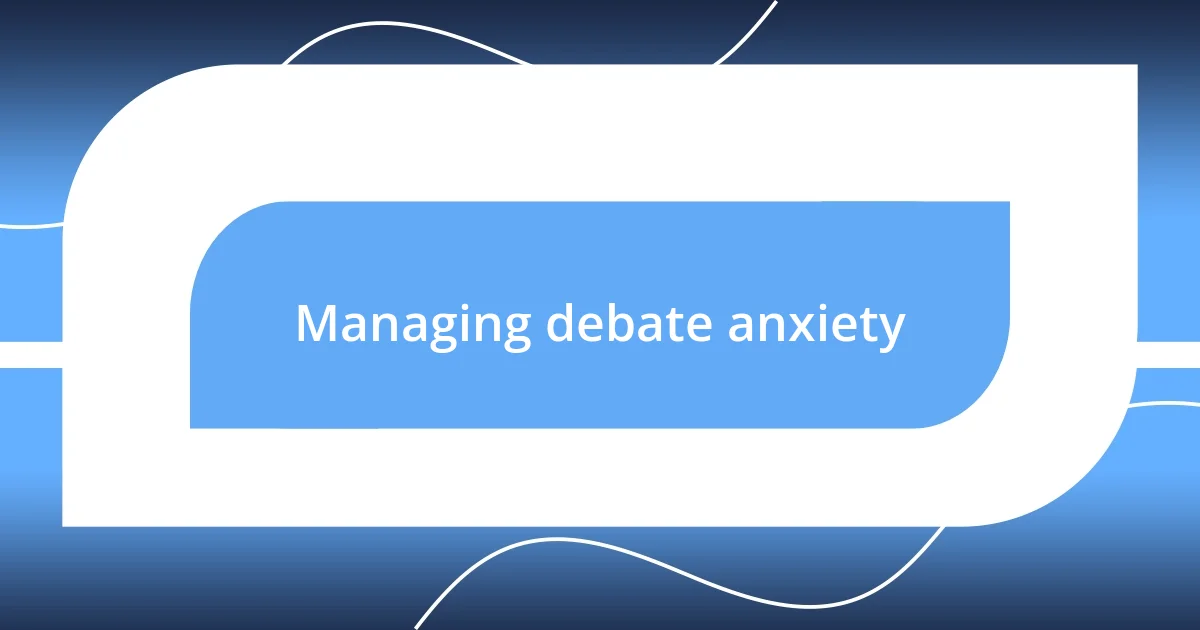
Managing debate anxiety
Managing debate anxiety has been a journey for me, and I found that preparation is absolutely key. Before a competition, I would take a moment to visualize myself on stage, confidently delivering my arguments. There were times I could literally feel my heartbeat quickening, but imagining a successful performance helped me channel that anxiety into energy. Have you ever tried visualizing your success? It’s remarkable how powerful the mind can be in calming those initial jitters.
Another effective tactic I discovered was deep breathing exercises. Just before stepping onto the debate floor, I’d take a few deep breaths, inhaling slowly and exhaling even slower. I recall one competition where I felt the weight of the world on my shoulders, but those breaths created a moment of stillness. They grounded me and made the chaos around me feel a bit more manageable. Isn’t it interesting how something as simple as breathing can ground us when anxiety starts to spike?
Finally, I learned to embrace my nervousness rather than fight it. Instead of telling myself to be calm, I reflected on the excitement of engaging with important topics. I once had a judge comment on my authentic passion during a round. It hit me that a little anxiety can fuel that passion, giving my arguments a life of their own. When I reframed my anxiety from a foe to a friend, I noticed a significant boost in my confidence. Do you see how shifting our perspective on anxiety can lead to better performance? It’s all about harnessing that energy and turning it into something positive.
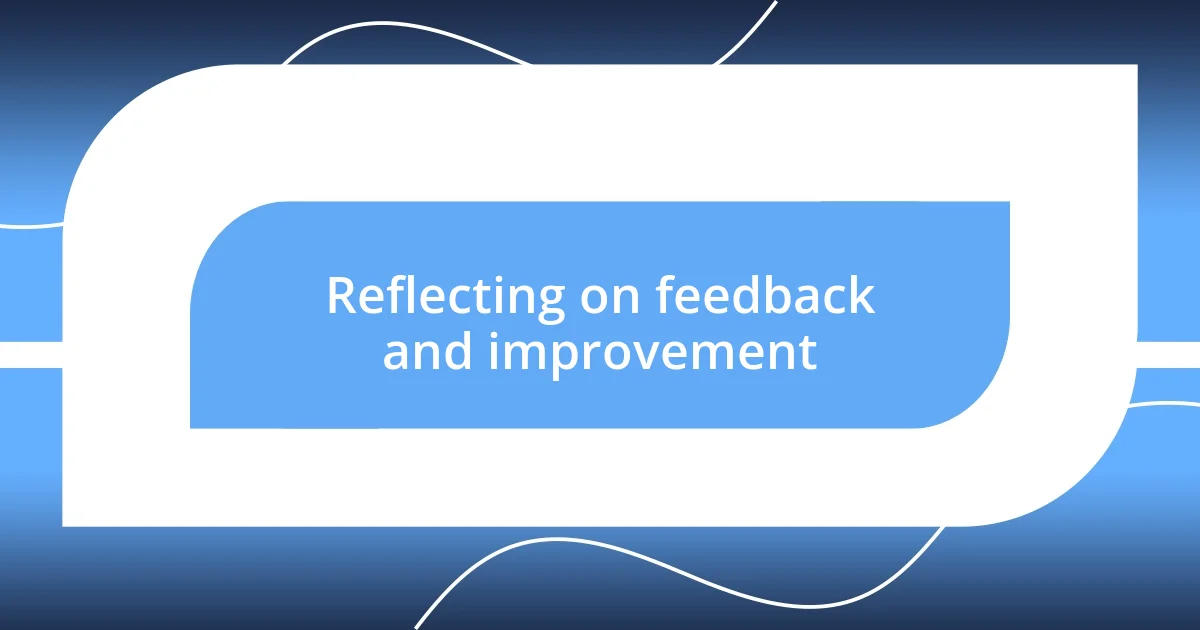
Reflecting on feedback and improvement
Reflecting on feedback was always one of those eye-opening experiences for me after a debate. After each round, I would jot down the judges’ comments and my own impressions, creating a space to explore how I felt about my performance. It’s surprising how much clarity can come from pausing to truly process both positive and constructive critiques. Have you ever looked back at feedback and realized you missed a crucial insight?
I remember a particular tournament where one judge pointed out my tendency to rush my conclusions. Initially, I felt defensive. However, after some reflection, I acknowledged that slowing down would give my audience time to digest my key points. The next time, I consciously paced myself, and the change in my delivery was palpable. It’s funny how a single piece of advice can lead to such a profound transformation. How many times have you overlooked small tweaks that could elevate your performance?
Moreover, I found that applying feedback in practice sessions made a world of difference. I often imagined incorporating a critic’s suggestions into mock debates. For instance, when a mentor advised me to use more sophisticated vocabulary, I spent hours reading passionately to build my lexicon. The growth wasn’t just in words; my confidence flourished alongside it. Reflecting on how feedback shapes our journey can sometimes open doors we didn’t even know were there. Isn’t it invigorating to think of how much we can improve just by listening?


